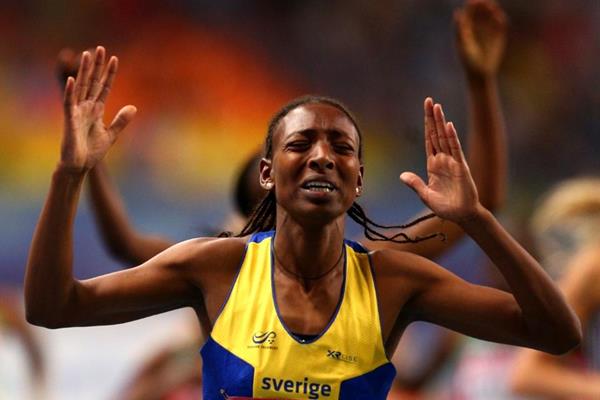Sweden’s Moscow 2013 1500m GOLD medallist, Abeba Aregawi now faces a ban from the sport after her ‘B’ sample came up positive for meldonium, a substance which was added to the World Anti-Doping Agency’s list of prohibited substances on January 1, 2016.
The Ethiopian-born athlete was provisionally suspended by the Swedish Athletics Federation for failing an out-of-competition test in Addis Ababa last month. Her ‘B’ sample now confirms the findings of the initial test.
According to www.sportal.co.nz, Aregawi released a statement through her agent Valentinj Trouw which reads,
“I have previously been given pills by a doctor in Ethiopia that I thought were vitamins. It’s my own fault I took these pills without checking. I also had a meeting with the IAAF, which I want to work with fully.
“I would like to apologise to the entire sporting movement in general and Swedish Athletics, my managers and coaches and in particular those who supported me over the years.
“They have all been a great help and a great support to me and I understand that I have hurt them and made them disappointed.”
Reacting to the news, SAF general secretary Stefan Olsson said: “This was an expected outcome so I’m not surprised. Doping is totally unacceptable in Swedish Athletics. We are at the forefront of anti-doping work, but this is clearly not enough.
“It is pleasing that Abeba has chosen to cooperate with the IAAF in this matter. It’s great that as much information as possible is shared with the IAAF in our continued efforts against doping. It is absolutely necessary for successful anti-doping work and an important step to restore confidence in athletics.”
Russia’s Tennis star Maria Sharapova also tested positive to meldonium in January, while her compatriot, Olympic ice dancer Ekaterina Bobrova, who won a team GOLD medal in the 2014 Sochi Games, also tested positive to the drug.
Will the meldonium pandemonium claim more scalps in the coming days?
Photo Credit: Getty Images

















